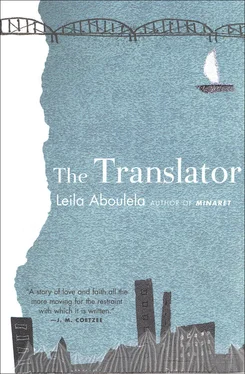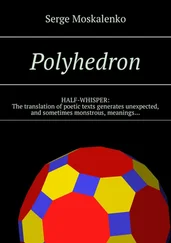Two weeks. Two weeks and she would be far away on another continent. Sunshine, no need to put on the lights indoors. In two weeks’ time she would leave this city. She had booked her plane tickets from London, she must book her train ticket from Aberdeen. She had bought the things her aunt had asked for, she must start packing. She thought of going home, seeing home again, its colours again and in spite of years of yearning, all she had now was reluctance and some fear.
The past intruded when she wanted only the present. Wanted these two weeks before she left the city. The past came and lined up before her, demanding recognition. The time before she started working in Rae’s department. She worked in Languages and sometimes translated things for the Council: English to Arabic, leaflets about the health services, about classes in English. An incident from that time: a Libyan woman in hospital and Sammar was asked to go to Foresterhill and interpret for her. The woman didn’t know English and her husband who did was away off-shore. But Sammar refused to go, she could not face the hospital after Tarig. And she drowned her guilt about the Libyan woman in oceans of sleep. In her dreams she forgot that Tarig had died.
Her head in the Languages department was a woman named Jennifer, who one day, unexpectedly and abruptly, called Sammar, asked her to sit down and said that she was not religious but respected people who were religious. That was during the Gulf War, when suddenly everyone became aware that Sammar was Muslim. Once a man shouted at her in King Street, Saddam Hussein, Saddam Hussein.
Jennifer said, ‘My boyfriend is Nigerian,’ and paused as if that statement had a deeper meaning she wanted Sammar to grasp.
Sammar sat and nodded politely. She felt like a child who had stayed up too late at night and was discovering that in the adult world there were things she could not understand. Jennifer talked away fresh and brisk, reassuring her of how broad-minded and tolerant she was, not like so many people. ‘For example,’ Jennifer said, ‘I have no problem at all with the way you dress.’
When Sammar finally spoke, she managed, ‘Thank you,’ and went home and slept. She slept deeply and continuously until the next day.
It was part of her remit to work for other departments if they needed her. This was how she met Rae when he sent her articles from Arab newspapers, the aftermath of the Gulf War. The first time she went to see him, he surprised her by being not rushed for time, not distracted by other things. She was used to busy people, a tightness in time. Instead, after discussing the newspaper articles, he told her about the time he lived in North Africa and asked her about her name, an unusual name. Lulled by his manner, she said, ‘There is a Lebanese ladies’ magazine called Sammar,’ and immediately thought, what a silly thing to say, what an inappropriate thing to say. But he didn’t look surprised or amused. He said quite seriously, ‘I have not come across this magazine.’
People spoke about him: his students, his secretary, Yasmin. It was through him that Sammar met Yasmin. Yasmin who talked so fluently and knowingly about the Gulf War, immigration, ‘these people’. She told Sammar that Rae had been on television several times and on the radio during the war. She would come to work the following morning and the department’s answering machine would be jammed with messages, angry voices… You are a disgrace to our universities, we pay taxes… You don’t know what you’re talking about, fighter-planes aren’t enough for this war. We need to drop an atomic bomb once and for all… And after a radio programme, Is This War A Holy War? You wog bastard, may I remind you that England is a Christian country, and it would be a good thing if you and all the rest of the odious wog bastards were to go back to the land of Allah. Since you bastards came to England this country has become the asshole of the West…
Sammar remembered Yasmin telling her all this in the car one Saturday on the way to a DIY shop, Yasmin mimicking the man’s London accent.
‘Did Rae get upset?’ Sammar had asked.
‘No, he laughed.’
And Sammar pictured the scene in the secretaries’ office, Yasmin replaying the tape first thing in the morning, Rae standing still wearing his jacket because he had just come in. Some of the blinds in the room would still be drawn, the department still sluggish, no footsteps of students, a few members of staff coming in to check their mail, mumbling greetings, lingering at the sound of the tape. Rae would have listened to the unclear voice on the tape, the message left for him, then laughed alone, for no one else would laugh, and wiped his face with his hand.
Thirteen days to go.
Her date of departure loomed ahead, solid as rock, impressive as a mountain. The days were numbered. They dwindled and by their nature could not increase. But they were not normal days, they expanded as if by magic, they stretched out like trees, and the hours passed like the hours of a child, they did not flicker or melt deceptively away. She thought that it was not true what people said, that time passed quickly when you were happy and passed slowly when you were sad. For on her darkest days after Tarig died, grief had burned away time, devoured the hours effortlessly, the days in chunk after chunk. Now every day stretched long and when Rae spoke to her a few words, when they only saw each other for a few minutes, these minutes expanded and these words multiplied and filled up time with what she wanted to take with her, what she did not want to leave behind.

My last twelve days. My last ten days.
He said it was her soup, her soup was the catalyst that made him recover. He was back working a full day, he no longer coughed.
She said, ‘Allah is the one who heals.’ She wanted him to look beyond the causes to the First, the Real.
‘When I was young,’ he told her, ‘there were books that did not impress me much. Picture books of Angels with blue eyes and wings, naive animals in pairs boarding a ship, too many fluffy clouds.’
When she was young there were the words of the Qur’an, no pictures of Angels. Words to learn by heart and recite in treacherous streets where rabid dogs barked too close. ‘Say: I take refuge in the Lord of daybreak…’,’Say: I take refuge in the Lord of humans…’ And at night too, inside the terrifying dreams of childhood, she had said the verses to push away what was clinging and cruel.
He said, ‘That is real, nothing trivialised, diminished to the status of fairy-tales.’ And he looked disappointed when he said that, distracted by thoughts he would only condense for her. ‘History diminished to the status of fairy-tales,’ he said. Covered with illusions, grid-lines, rules.
She said that she had imagined freedom in this part of the world, not rules, not restrictions. But she tried to understand, to take in this new picture he was describing. A sketch of the Scottish church and state. Calvinism, a dour and oppressive brand of Christianity. An upbringing so different from hers. Things he was told. He must not be sullen, he must not be cheeky, he must not be contradictory. He must not complain of boredom, only bores get bored. The value of pretending that all was well when it wasn’t. Such pretence was an art, a form of courage. Don’t think too much. Lighten up, you are too intense.
She said, ‘I never knew that to be intense was something bad.’
‘You are lucky,’ he said and smiled as if he loved her. Encouragement to speak. Again the stray dogs, the threat of rabies, cholera, bilharzia. Lepers like in films, and a day in May when the whole school was inoculated against meningitis, the injections shot out of a pistol, girls fainting in the sun. A time when she belonged to a particular place, before she knew the feeling this has nothing to do with me, these shops, these people have nothing to do with me, this sky is not for me. Times when she was silent but never detached: watching her aunt rub the luxury of Nivea on her legs, the white cream disappearing into her skin, over the sketch of bluish veins, over her ankles, the polish of her nails. Her aunt’s face so serious: this was something important, necessary, not a game. ‘Can I put cream on too?’ But she must wash her legs first, otherwise the cream would all get mixed up with the dust. In the garden, Tarig was drinking from the hosepipe so when it was her turn she drank too. The water was warm, not cold like the water from the fridge, not smelling of food. She could drink and drink this water and never feel full. Wash her feet, her legs up to her knees. The water splashed on the mud of the flower beds, made a path into the garden. Tarig climbed the low wall, balanced. ‘I fixed your bicycle,’ he said. There was the sound of the water, a distant car, a few birds. There was the voice of the cook, sitting in the shade of the guava tree reading the Qur’an, his shoulders swaying back and forth with the words.
Читать дальше













